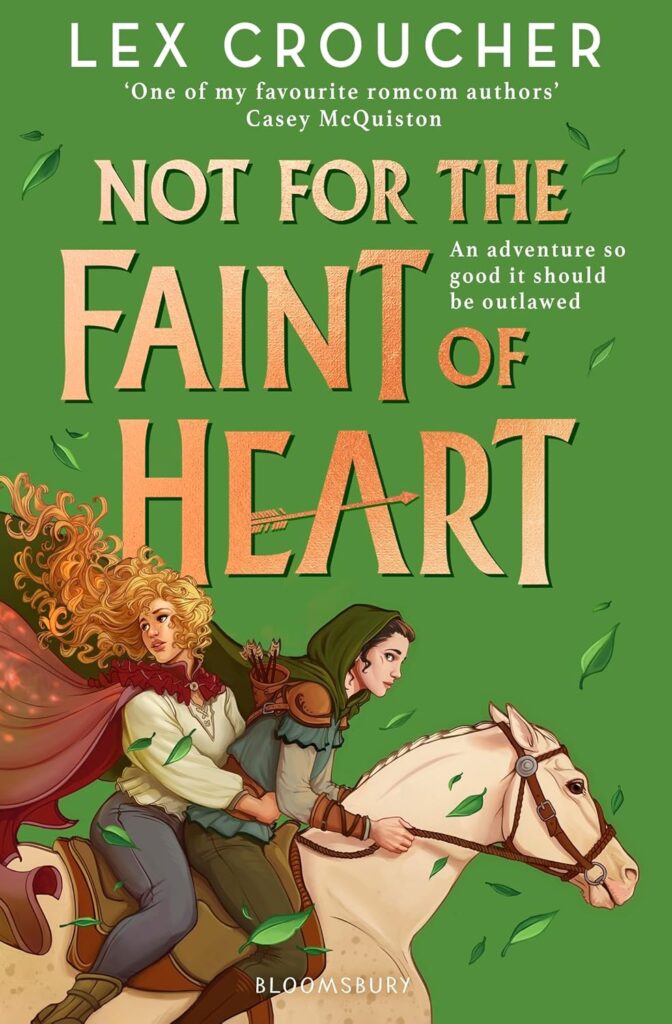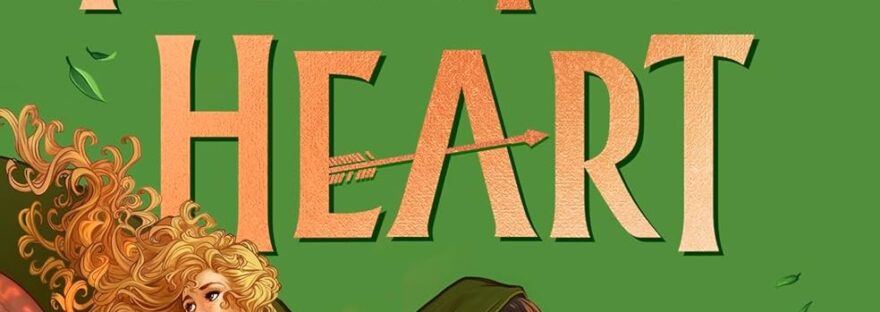By Lex Croucher (Bloomsbury, 2024)
‘It wasn’t meant to be violent,’ Mariel said reluctantly.
‘What?’
‘The kidnapping,’ Mariel snapped. ‘I may have been overzealous with my instructions. It was just meant to be…fast.’
‘Ah, yes. A nice clean abduction, with proper attention paid to the procedures.’
‘Stop being so dramatic. You’re just on loan.’
‘You shouldn’t kidnap innocent people, Captain,’ Clem said sharply. ‘People might get the wrong idea about you and your merry mates.’
When Clem is kidnapped by the Merry Men, she’s excited. She’s heard tales about their bravery and the good they do, even if her mentor Old Rosie says otherwise, and dreams of helping them. And although Mariel, the captain of the motley band who take her, is standoffish, the others seem nice enough. You know, for kidnappers.
But the more that Clem sees and hears of the larger organisation, the less it seems so…merry. And the more she inflicts her backwoods cheerfulness on the group, the more they seem to question this themselves.
When the Commander of the Merry Men, Mariel’s father, is ambushed and kidnapped, the group disobeys orders to go after him. The future of the Merry Men – and the people of the forest they once swore to protect – is at stake. And Clem won’t let Mariel do it without her.

To be clear from the off, this is a young adult book, and yes it is somewhat of a romcom. At its heart though, it’s an adventure story that looks at the cost of freedom and what happens when the attempt to do good loses its way. It’s just delightfully queer at the same time.
The story is set a couple of generations after the familiar tales of Sherwood forest. Gone are the days of Robin’s swashbuckling; now the Merry Men are organised, militarised, with ranks and strategies. And they’re so focused on the bigger picture of “winning” that they’re forgetting about the people who they started all this for.
The intention behind the actions is still there; to free the forest and its people from the control of the evil Sheriff and his lackeys. But at what cost to the people themselves, drawn into situations unprepared, whose villages become their battlegrounds? The movement has lost its way – and this is when we meet Mariel and Clem.
Clem is a healer from a small village working alongside Old Rosie, who believes that politics should be left at the door. If someone needs a healer, they heal them – even if they do work for the Sheriff. And this is why Clem gets kidnapped by the Merry Men; to send a message that helping the enemy will not be tolerated.
Its safe to say that these are not the Merry Men of the traditional tales! Into this fray is brought our ensemble cast, a small group of younger people captained by Mariel, daughter of the Commander and granddaughter of Robin Hood himself.
Clem and Mariel are our focal characters, and they couldn’t be more different. Clem is scatter-brained at times, but eminently practical, even caustic, when someone is hurt or needs help. At first she seems naïve, but the truth is that she just wants to believe the best of people – at least up to a point. Even her goodwill has limits though, and she’s not without her own trauma.
At the age of 18, Mariel is the youngest captain to date, making her desperate to please her austere father. She is outwardly serious and severe, a trait that butts up against Clem’s positivity and chattiness. Once you meet her father, you can see exactly how she ended up this way, and it pains you to read of the level of pressure on one so young.
Their love-hate relationship is both sweet and frustrating, exactly how it should be, as Clem learns to give Mariel grace and understanding, and Mariel learns that there is more to life than pleasing her father. It’s a slow-burn “will-they-won’t-they (of-course-they-will)” as they both begin to see beyond the other’s outward appearance and connect with the person underneath.
Each member of the band is there for different reasons, and I liked the fact that not all of them were tragic. Some come from families that are wealthy but emotionally distant. Others are born to the life. Some further still join because they want to do good.
Every character is unique and perfectly memorable, bringing a different strength to the group. I loved all of them, but have to confess that I was particularly fond of the quiet-spoken Kit – always helpful, and the first to consider Clem’s wellbeing after the initial kidnapping.
The language used by the characters is modernised, although the story itself isn’t. Considering that the main characters are teenagers (the youngest I believe is Morgan at 14), I didn’t find this jarring at all – if anything, it made it an easier read. (To be clear, I don’t mean modernised as in current slang, just more modern word use that improved the flow.)
For those who want to view the original Robin Hood tale as a “happily ever after”, this story might feel uncomfortable. But I think it’s a prescient reminder to be on your guard, to ensure that your good intentions are backed up by noble actions; to avoid crossing that line for the “greater good” that betrays your beliefs and is difficult to come back from. It’s an interesting look at how values can get lost within the bigger picture.
This isn’t to say that the story is all doom and gloom! The characters have a lot of fun together, in a way that feels very real for a friendship group. There’s some classic romcom tropes, such as there not being enough beds so some people must share, or when Mariel sees Clem in a dress for the first time.
I loved the section set in the secret hideout of Underwood – of which there is a fantastic layout drawing at the start of the book – as there is a real feeling of camaraderie and care between the members of the Merry Men on a larger scale, which contrasts the more serious feeling in the outdoor camps.
There are also some classic “Robin Hood” style moments such as a wealthy merchant being relieved of his possessions that are given to those in need, or a daring jailbreak. And it’s moments like these that solidify for the characters that something is missing in their “noble cause”.
As a young adult adventure story, it is worth noting that there is swearing, loss and character death, panic attacks, trauma, and implied sexual intimacy. There are some big emotional moments when you learn the truth about actions taken, by both the Merry Men and the Sheriff, that can be quite heart-breaking.
It’s also delightfully queer, as previously mentioned. Although I wouldn’t personally say that romance is the main focus of the book, it is still undeniably there. There are plenty of LGBTQ+ characters, with diverse races and genders, and themes around class and oppression, but also the importance of found family. If you’re the kind of person who uses the word “woke” as an insult, then this book is probably not for you.
For the rest of us, we get to enjoy this exciting and charming romp, that will make you laugh, bring you to tears, and make you believe not only in love, but in stepping up to do the right thing.
If you want to join the Merry Men, you can grab a copy of Not for the Faint of Heart at the link below.
(Disclosure: If you buy books linked to our site, we may earn a commission from Bookshop.org, whose fees support independent bookshops.)
Looking for more young adult reads? Check out some of our previous book reviews here.

